Tourism to Vietnam is growing faster than ever. As the number one tourist destination in the country, Halong Bay has borne the brunt of this influx of new arrivals, leading to overcrowding, pollution and higher prices around the UNESCO World Heritage site. Increasingly, people are looking to Halong Bay’s neighbor across the Gulf of Tonkin as an alternative to the negative effects tourism has had in the region.
Bai Tu Long Bay’s popularity has shot up in recent years and tour companies have completely latched onto it. The question of Halong Bay or Bai Tu Long Bay has never been more prevalent than it is now, so we have decided to compare the two in each aspect of their being to give you an idea of which suits you best. It’s the descending mother dragon versus her children: it’s Halong Bay versus Bai Tu Long Bay.
Beaches
| Halong Bay |
Titop |
Bai Chay |
Tuan Chau |
Soi Sim |
|
| Bai Tu Long Bay |
Ban Chan |
Ngoc Vung |
Quan Lan |
Minh Chau |
Tra Gioi |
First off, one of the Gulf of Tonkin’s top attractions; its various white sand beaches. For sheer quantity, Bai Tu Long Bay wins here, but if all of its beaches were stony with lots of washed-up rubbish, then quantity doesn’t really count for much.
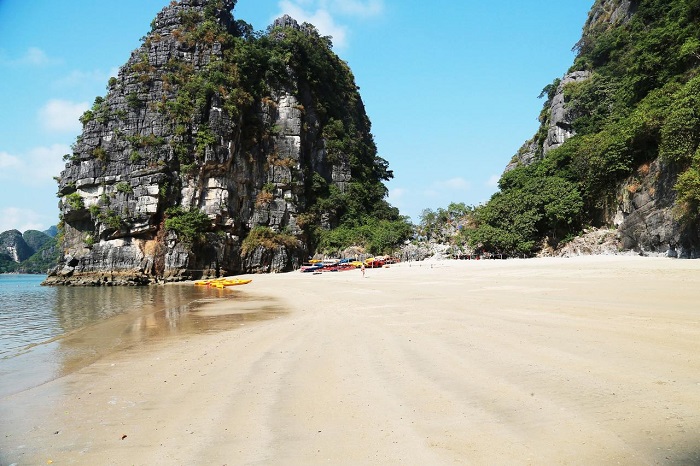
As it goes, Bai Tu Long Bay’s beaches are nothing like that. Perfect white sand features in some of the bay’s isolated beaches, and of these, Ban Chan is probably its longest and most popular. It is located in a large alcove of Bai Tu Long Bay, flanked on both sides by limestone rocks with a curved cliff face behind it. The forested nature of these rocks, along with the beach’s isolation, gives Ban Chan a very ‘Castaway’ feel. Many of the bay’s other offerings, such as Tra Gioi, are minuscule in size, but look positively heavenly in appearance, offering fantastic photo opportunities for anyone who is passing.
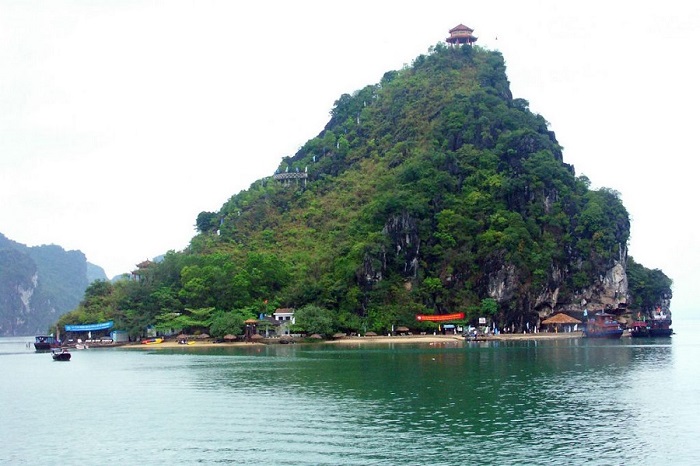
In comparison, the beaches of Halong Bay do not fare well. The few beaches that are available for visiting are overwhelmingly popular, with vast swathes of tourists converging near the mainland on the overdeveloped Bai Chay Beach or at the harbor on the artificial Tuan Chau Beach. Another of Halong Bay's artificial beaches is Titop, one of the few beaches away from the mainland, located on Titop Island in the center of the bay. The island itself has many great activities such as relaxing, swimming and hiking to the peak for a panoramic view of the undulating Halong Bay scenery, but its tourist numbers negate a lot of its good aspects. This is one of the most visited areas in Halong Bay and the vast majority of tours, both overnight and day, will stop off for at least an hour, making crowding its number one problem.
Caves
| Halong Bay |
Sung Sot |
Thien Cung |
Trong |
Trinh Nu |
Dau Go |
Luon |
| Bai Tu Long Bay |
Thien Canh Son |
|
|
|
|
|
Honestly, we could name more caves in Halong Bay, but we don’t want to overshadow Bai Tu Long Bay too much. You might be able to tell the winner of this round already; the depth of choice in Halong Bay for caves far outweighs the single offering in Bai Tu Long Bay, but what other factors affect their appeals?
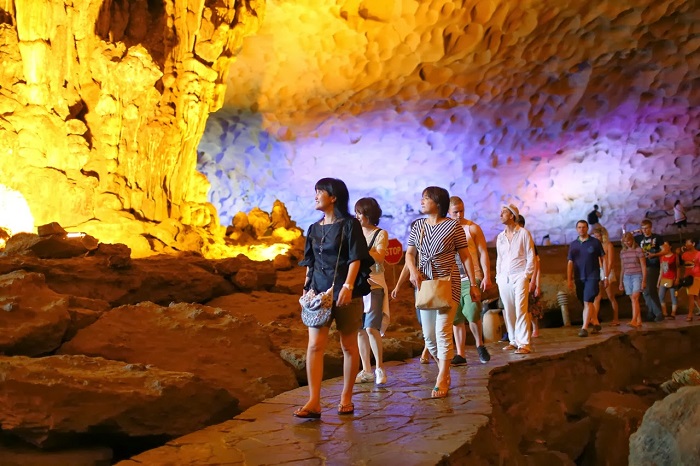
Sung Sot is Halong Bay’s premier and most impressive cave. Indeed, it does get high tourist numbers, but the beauty and aura of the cave are such that you won’t notice them for the most part. Sung Sot houses hundreds of amazing rock formations caused by years of water drippings, all illuminated in colored light for a more dramatic presence. Luon is perhaps the most beautiful of Halong Bay’s caves. The corridor of water that leads through the cave is traversable by kayak and, while very short, it opens up onto a lake enclosed by high-stretching limestone walls, adorned with trees where monkeys often frolic. The aura of the hidden lake with its shimmering emerald waters is nothing short of magic; a feeling you can experience in relative peace as you will not be sharing Luon Cave with many other tourists.
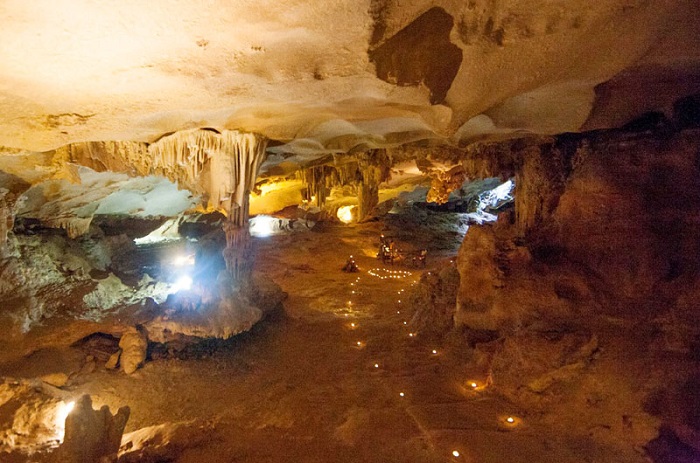
Though a feature of almost every tour of Bai Tu Long Bay, Thien Canh Son gets mixed reviews from visitors. While undoubtedly still impressive, when compared to the caves of Halong Bay, Thien Canh Son comes up much smaller with a lot fewer rock formations to attract the eye. Tour companies like to stretch out visits, but once you’ve seen the rock sculptures and climbed the staircase to the admittedly beautiful viewing platform outside, you’ll wonder why you’re still there.
Fishing Villages
| Halong Bay |
Cua Van |
Ba Hang |
Tung Sau |
| Bai Tu Long Bay |
Vung Vieng |
|
|
Fewer options for both destinations in this round, though clearly three trumps one in favor of Halong Bay. Floating fishing villages prompt some of the most evocative images of the Gulf of Tonkin and are a huge part of the appeal for both Halong Bay and Bai Tu Long Bay. Such floating enclaves have been on the decline ever since tourism swept the bays as the Quang Ninh Tourism Board, the province that operates both Halong Bay and Bai Tu Long Bay, have made rather forceful efforts to clear up villagers’ littering habits by building houses for them on the mainland and integrating them into mainland society. Naturally, this hasn’t gone very well, and once the board realized the potential tourist pull of the fishing villages, financial incentives were offered for villagers to return back to their seaborne homes to resume the only way of life they know.
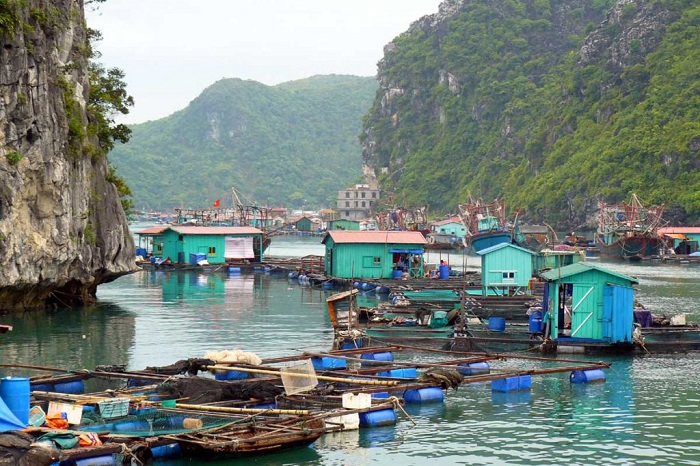
If international acclaim is the criterion for this round, then Cua Van can claim the prize for Halong Bay already. The colorful floating village in the heart of Halong Bay made the list of Huffington Post’s 11 Insanely Beautiful Small Towns from Around the World, inducted for its ‘teal water, colorful raft houses, limestone hills, and winding streets’. As one of the few showcase fishing villages in Halong Bay, Cua Van offers plenty of beauty but is really nothing more than a historic time capsule of the old way of life before the introduction of tourism. Tung Sau provides tourists with a brief history of pearl farming in the region, through its old Japanese methods to modern-day practices, but similarly, is only there to draw tourists.
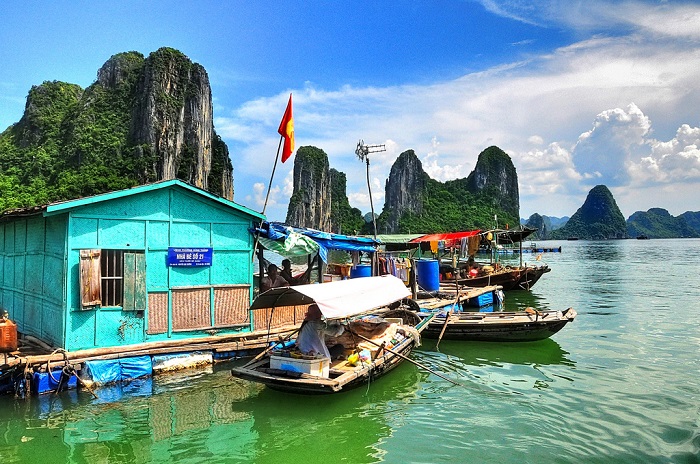
Lack of choice is Bai Tu Long Bay’s downfall again, as its single offering of Vung Vieng fishing village is yet another token attraction for tourism. The splendor of the vibrant color of its walls sitting ahead of a backdrop of jutting karst scenery is a beautiful site, just as it is with Cua Van. Tours of this fishing village are via self-propelled kayak or local sampan boat, the latter of which is rowed by a villager who will explain their way of life to visiting tourists. The traditional life has all but dried up here since tourists began flocking to the area, as income from fishing has been replaced multiple times over by tourism, but the majesty of Vung Vieng’s existence at all is reason enough to visit.
Halong Bay or Bai Tu Long Bay?
• Much closer this time, but Halong Bay is the winner for its mixture of fishing and pearl farming.
Kayaking
| Halong Bay |
Cua Van and Tung Sau |
Luon Cave |
Hang Ho Dong Tien |
| Bai Tu Long Bay |
Cap La Tra San |
Cong Do |
Cong Dam |
In 2017 the Quang Ninh Tourism Board put a no-exceptions ban on kayaking around both bays in order to protect their integrity. In typical Vietnamese fashion, the ban lasted a solid month before being revoked, meaning kayaking is now permitted in only eight specified areas. Kayaking remains one of the most popular things to do in Halong Bay and Bai Tu Long Bay for the unbeatable feeling of freedom that one can garner from gliding around the foothills of water-borne mountains.
For Halong Bay, many of its natural attractions are best explored by kayak, but most tour companies opt for Cua Van and Tung Sau as their primary locales. As mentioned above, both areas contain a trove of natural beauty as well as history and culture to boot. While the merits of kayaking around the stunning Luon Cave have been mentioned already, Hang Ho Dong Tien (Fairy Lake Cave) is an all too often overlooked attraction, which is ideal for kayaking. Entrance to the cave is done via water, while the exterior opens up for miles around, giving you a lot of free reigns.
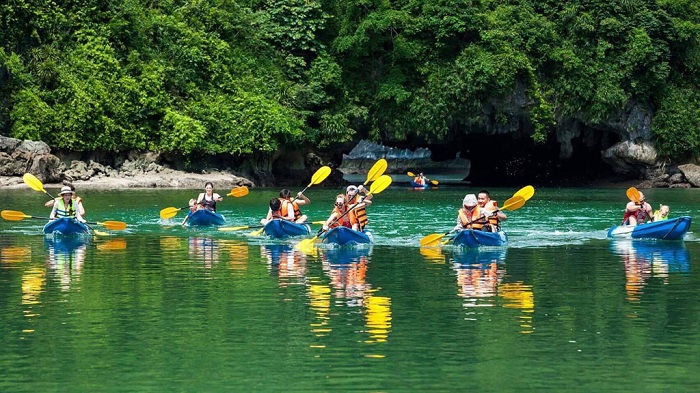
Bai Tu Long Bay shines in a whole new light from the dipped seat of a kayak. Its twin areas of Cap La and Tra San are prime kayaking destinations for their vastness and tranquillity. Some tours spend entire mornings or afternoons in these quiet regions, watching kayakers carefully as they skirt the enclosing walls draped in casuarina pines and other verdant foliage. The space afforded by Cap La and Tra San are their biggest draws, but similar freedom can be found at the favored sleeping area of Cong Do, as well as beautiful Cong Dam. Some of Bai Tu Long’s Bay’s many tiny beaches cling to the islands of Cong Dam, yielding a proud sense of achievement for anyone who discovers one.
Tourist Numbers
Bai Tu Long Bay’s trump card over Halong Bay is its much lower levels of tourist numbers; or so it was in the past, anyway. As Bai Tu Long Bay fostered a reputation for being the quieter, less-explored alternative to Halong Bay, tourists began to eschew the crowds of the latter and flock to the former. The mass migration has actually balanced out the numbers of tourists somewhat, and while many perceive Bai Tu Long Bay to still be the quieter cousin of Halong Bay, it is not so much the case nowadays.
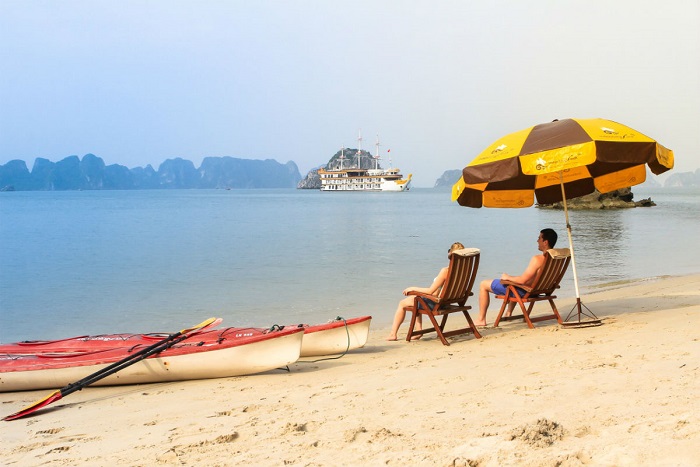
New tours are forbidden from starting operations in either bay now, as the Quang Ninh Tourism Board is struggling to cope with the crowds that converge on both Halong Bay and Bai Tu Long Bay on a daily basis. Truly, the only unexplored bay left in the Gulf of Tonkin is Lan Ha Bay, south of Halong Bay and currently boasting unblemished beaches, undiscovered caves, and unpolluted waters. All of this is finite for Lan Ha Bay, however, as the migration is starting to begin. Lan Ha Bay offers the same stunning scenery as both of its northward neighbors, boasting the beautiful island of Cat Ba along with many others, while transit time to Lan Ha Bay from Hanoi is just under half of what it is from Hanoi to Halong Bay or Bai Tu Long Bay.